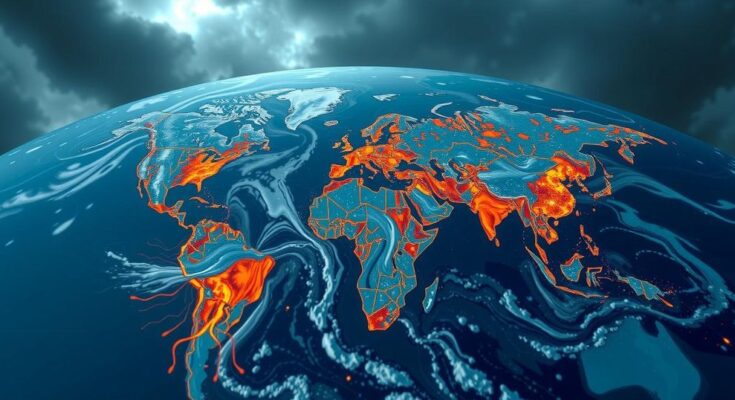The climate crisis is linked to increasing extreme weather events due to human-induced climate change. Climate attribution studies provide clear evidence showing that the burning of fossil fuels significantly intensifies heatwaves, floods, and storms. The majority of analyzed weather events have been worsened by global heating, highlighting an urgent need for action to combat these changes and their impacts on vulnerable communities.
The question of whether the climate crisis is responsible for extreme weather conditions has elicited significant concern and inquiry. Recent scientific analyses, known as climate attribution studies, have established a clear link between anthropogenic climate change and the increasing severity and occurrence of extreme weather events. These studies indicate that the fossil fuel emissions have so radically altered the planet’s climate that phenomena such as heatwaves, floods, and storms are now occurring more frequently and with greater intensity than experienced in the entirety of human history. Climate attribution studies employ a trifecta of methodologies to reliably assess the impact of human-induced climate change. Firstly, they compare contemporary weather data to historical data to ascertain changes in the frequency and intensity of weather events. Secondly, advanced climate modeling allows comparisons between current and pre-industrial climates, and thirdly, models simulate climate from earlier periods to present, enabling the identification of patterns and trends. These rigorous scientific methods provide compelling evidence of climate change’s role in exacerbating extreme weather conditions. Notably, studies have found that extreme heatwaves are now a frequent occurrence that would have been unlikely, if not impossible, without global heating. To date, over 24 previously unimaginable heatwaves across various regions, from Europe to North America and beyond, have been attributed to climate change. Additionally, research covering 744 attribution studies reveals that approximately three-quarters substantiate that global warming has a demonstrable effect on the severity of extreme weather events. The findings emphasize heatwaves as the most significantly affected extreme weather events, with 95% of analyzed occurrences intensified by climate change. Conversely, while floods are more complex due to local factors like infrastructure and terrain, analysis still indicates that over 60% of flooding events have been worsened by global heating. Similarly, drought events also demonstrated a pronounced trend, with nearly 70% made more likely due to climate change. Furthermore, research extending to assess human mortality due to extreme weather has indicated alarming correlations. For instance, one study estimated that one in three newborns affected by heat in certain nations would not have succumbed had climate change not escalated local temperatures. Other analyses have linked climate change to substantial economic damages from natural disasters, delineating the disproportionate impact on marginalized communities, who often face increased vulnerability. The intersection of climate research and accountability is increasingly pertinent, as attribution studies are being utilized in legal contexts to ascribe responsibility for climate-related damages. This evolving field holds promise for informing policy discussions and fostering greater accountability among major polluters. Despite the ongoing need for further research, the existing evidence sufficiently underscores that climate change is actively reshaping the landscape of extreme weather phenomena, necessitating urgent global action to mitigate its effects.
Understanding the relationship between the climate crisis and extreme weather is critical in addressing the ongoing impacts of climate change. As global temperatures rise due to human activities, the intensity and frequency of extreme weather events such as heatwaves, floods, and droughts have become more pronounced. Climate attribution studies play a vital role in quantifying these changes by linking specific weather patterns to human-induced climate change. This scientific approach aids in distinguishing between natural variability and anthropogenic influences on extreme weather, providing clarity on the extent to which human activities are reshaping our climate.
In conclusion, the evidence derived from climate attribution studies unequivocally demonstrates that human-induced climate change is significantly altering the patterns and intensity of extreme weather events. The alarming frequency of heatwaves and the exacerbation of other natural disasters underscore the urgent need for comprehensive action to address the underlying causes of climate change. By understanding and acknowledging the impacts of our actions, society can work towards mitigating the severe consequences that climate change poses to communities worldwide.
Original Source: www.theguardian.com




